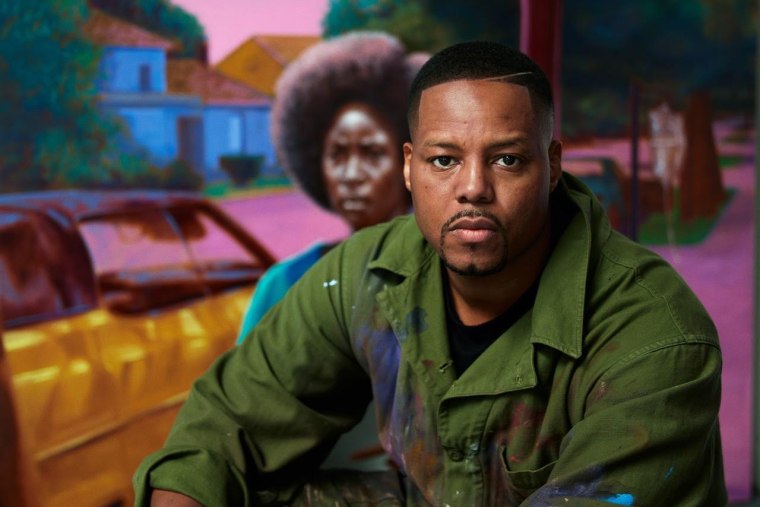Figuring out how to heal from intergenerational trauma is at the center of “Exhibiting Forgiveness,” a new semi-autobiographical film by acclaimed artist Titus Kaphar, starring actor André Holland.
Tarrell is a successful artist modeled after Kaphar who, despite having a loving wife, Aisha (played by Oscar nominee Andra Day), and doting son, Jermaine (Daniel Michael Barriere), still suffers from the childhood trauma he endured through his drug-addict father, La’Ron. Tarrell falls into an emotional tailspin after his mother, Joyce (Oscar nominee Aunjanue Ellis-Taylor), whom he adores, urges him to speak with and forgive La’Ron.
“It was clear to me, it was a super personal story, which is always a good sign,” Holland told NBC News about first reading the script.
Kaphar, a 2018 MacArthur “genius grant” fellow, explained that while he was visiting his home state of Michigan with his wife and two sons, he had an unanticipated encounter with his father. Pushed by his grandmother, Kaphar found himself face-to-face with his father in a basement, probing him while filming his reactions.
“I showed up, turned on the camera, and started asking him the hardest questions I could possibly ask him, thinking that it would stop the conversation, and it didn’t,” Kaphar said. The interaction sparked “this weird internal struggle,” he said. “Part of me didn’t want to be there at all, and part of me just was enthralled by understanding the history a little bit better. So I was just going through this struggle.” That moment is one of several powerful exchanges in the film.
While “Exhibiting Forgiveness” recognizes how Tarrell’s success as an artist is rooted in the strong work ethic his father drilled into him, it doesn’t forget the emotional toll it still takes on Tarrell.

La’Ron, played by stage actor John Earl Jelks, grew up with Jim Crow segregation and sees a strong work ethic as the survival mechanism he’s passed on to his son. But those moments of young Tarrell, portrayed by Ian Foreman, working like a grown man clearly qualify as child abuse to the audience. That La’Ron’s drug addiction led to Joyce, Tarrell’s mother, being harmed still angers Tarrell.
“The emotional life of the character was challenging to me because he goes through all the range of emotions,” said Holland, who learned how to paint for this role. “We see him go through so much in such a short amount of time. As an actor, you both want that challenge, but, also, it’s a little scary. It’s the kind of part where you can’t really hide from it; “You can’t fake it.”
Filming the exchanges between the two men of two different generations — with one purporting to have changed and the other only remembering his childhood, when his father was at his lowest — required Holland to bring his very best opposite Jelks, who earned a Tony nomination for the August Wilson play “Radio Golf” in 2007.
“I knew, without talking to him, that he was going to bring his A game like he always does. But, when I read the words, I said, ‘OK, I know he’s going to show up ready to go,’ so I had put a little extra preparation into that to make sure I was ready to go,” Holland said.

But it was another scene towards the end of “Exhibiting Forgiveness” directly intersecting Tarrell’s emotions with his work that really unraveled Kaphar, who created new paintings for the film.
“I just started crying. And I couldn’t stop crying. “I was so angry at myself, and I was like all these people are sitting here waiting for you,” he recalled. “I ended up having to leave the set, lock myself in the dark room and cry for like half an hour.”
That kind of raw emotion, Holland believes, is what makes “Exhibiting Forgiveness” more than a film.
“It seems to me that men tend to be especially prone to putting on a good face and ignoring what’s happening on the inside. But I think this movie shows us that not addressing those wounds, those traumas, inevitably comes out in ways that you often can’t predict,” he said. “So the movie definitely is trying to deal with that. And I think that’s one thing that people who have seen it take away from it.”
